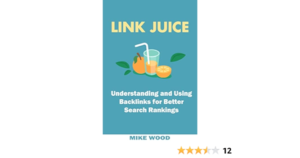Link Juice of a page is the value it passes to other pages through links. This is based on several factors, including the number of links and their quality.
The most useful links come from authoritative websites relevant to your business or niche. They also have high DA and DR metrics.

One of the key metrics used in assessing link juice is citation flow. A site’s citation flow is determined by the number and quality of inbound links. The more authoritative and high-quality a website’s links are, the higher its citation flow will be. This is because the quality and relevance of inbound links are considered a big factor in search engine rankings. Link juice is also passed on to any outgoing links on a site, so having high-quality, relevant outgoing links will increase a page’s citation flow and ultimately its ranking potential.
A webpage’s citation flow is measured by the DA of the websites that it has inbound links from, as well as the TF of the pages it has inbound links from. The citation flow is then divided by the website’s domain authority (DA). It is important to note that not all links will pass link juice, as it depends on several factors. For example, outgoing links from low-authority sites may not pass any citation flow. In addition, links that are not related to the topic of a webpage typically do not pass any link juice.
There are many ways to increase a page’s citation flow, including creating high-quality content, improving internal linking and using keyword-rich anchor text. It is also important to ensure that a page’s content is relevant and helpful to the audience.
It is important to spread the link juice across your entire website in order to improve its SEO. Many websites concentrate most of their link juice on their homepage, which can have a negative impact on other pages. To fix this, it is a good idea to use the skyscraper technique. This involves taking a popular piece of content and expanding it to make it more authoritative, informative, and comprehensive. This will help it get more shares, and ultimately, more link juice.
Another way to distribute link juice is to limit the number of links per page. This will reduce the amount of value that is lost through link dumping. Additionally, it is a good idea to use dofollow and nofollow links evenly to prevent over-optimizing a website. This will ensure that all of your web pages are receiving equal amounts of SEO value and improving the overall site’s performance.
Domain authority is a ranking factor that determines how likely a website is to rank high on search engine results pages (SERPs). It is determined by a combination of factors, including the number and quality of inbound links, the relevance of linked content, and the size of a site’s social media presence.
Link juice is the SEO value that a page receives from inbound links. It is important to note that not all inbound links pass the same amount of link juice. Some links are more valuable than others because they come from authoritative sources and are relevant to the topic of the page. Other factors, such as the number of inbound links and the location of a link within a page, also affect how much link juice is passed on.
Ideally, you want to distribute link juice evenly across your website. The best way to do this is by building external links, using internal linking, and using redirects. By doing so, you can ensure that all of your pages have a chance to rank well in the SERPs.
While many people focus on getting high-quality backlinks, they often overlook pools of link juice that are already on their website. There is a good chance that your website has reservoirs of link juice on its most popular pages, waiting to be distributed through internal linking.
Another way to distribute link juice is by using 301 redirects. By redirecting a webpage to another page on your website, you can send most of that page’s link juice to the new location. This is a great way to promote a new piece of content and boost its visibility on the SERPs.
When creating your internal links, try to keep them as relevant as possible. For example, a link from a page about healthy recipes will be more relevant to a health blog than a movie review. Finally, make sure to use tools like Moz and Ahrefs to help you determine a page’s authority before passing it on to other pages. The higher a page’s authority, the more link juice it will pass on.
Page authority is a ranking factor that determines how well your website ranks in search engine results pages (SERPs). It is an evaluation of the credibility and value of a page, based on several factors. The higher the page authority, the better it will rank. This ranking factor is determined by the number and quality of inbound links, as well as the relevance of the linked content.
Link juice is a term used to describe the amount of PageRank or link equity that a page passes on to other pages within the same domain. The more link juice a page has, the higher it will rank. This is important because search engines like Google consider PageRank to be a very strong indicator of the quality of a website.
The main goal of SEO professionals is to create a website with high link authority and good inbound links. This can be done by creating content in niches or industries that are related to your business and linking to it with relevant pages on other sites. In order to make the most of your link juice, you should avoid using nofollow links or placing them in non-relevant sections of your site.
Moreover, you can also use internal linking to pump link juice to other pages of your own site. However, you should be aware of the fact that different pages within your website have different levels of PageRank and will pass on a different amount of link juice to other pages. This is a good reason why it is necessary to have a clear structure of your website with clearly defined categories and subcategories.
Another way to pass link juice is through the use of redirects. This is a useful technique to transfer the authority of an outdated page to a more recent one. However, it is important to remember that this method is only effective if you are able to find an appropriate page to redirect to. In addition, it is essential to note that the page that is redirected must be related to the original one in order to avoid any penalties from Google.
Domain age is one of the most important factors in link juice. Older domains have more authority and are considered to be more trustworthy by search engines. Newer domains, on the other hand, have less authority and are viewed as being riskier. This is why it’s best to stick with well-established sites when you’re looking for a new domain to buy.
A webpage’s rank in search engine results pages (SERPs) is largely determined by the quality and quantity of its links. These links can come from external websites, such as other blogs or news sites, or they can be internal links that connect different pages on a website. Both types of links are valuable, but internal links are usually given more weight because they are considered to be more trustworthy by search engines.
It is also important to note that not all links are created equal. Some links have more value than others, and this is because of their relevance to the page they are linking to. For example, if you get a link from a page on digital marketing tactics, this will have more value than a link from a page about Margherita recipes. Therefore, it is crucial to have a diverse link portfolio when trying to build link juice.
Getting quality links is vital for increasing the strength of your site’s ranking. This is why it’s important to use a tool like Seobility’s Backlink Checker, which can help you find high-quality links that will improve your chances of ranking in SERPs. Using this tool will help you maximize your search engine optimization efforts and increase your chances of ranking on top.
Although Google has been de-emphasizing the importance of links in its algorithms and public rhetoric, it still relies on them to a large degree. This is because its algorithm is based on a complex formula that determines the importance of a web page. It takes into account the number and quality of links that a page has, as well as its PageRank. Consequently, the more relevant and authoritative pages that link to a page, the higher it will rank on Google’s SERPs.

